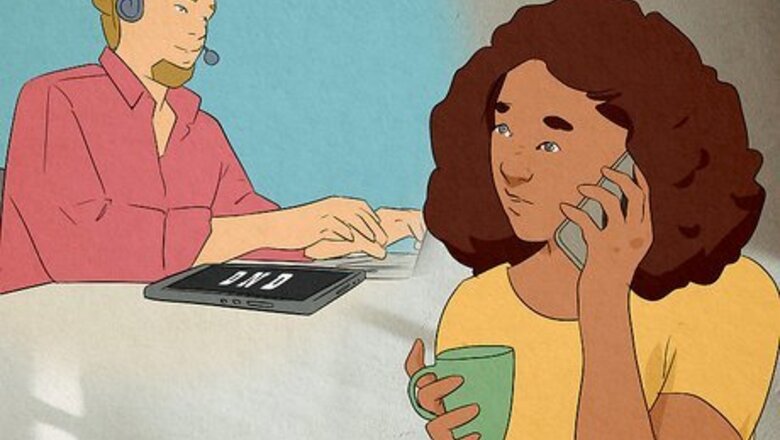
views
- Most often, his phone goes straight to voicemail because of tech reasons like Do Not Disturb, Airplane mode, or a phone that’s out of battery.
- Your call may also go to voicemail because your boyfriend is stressed, overwhelmed, busy, or just needs some personal time.
- Leave your boyfriend a voicemail or text that calmly explains your concern, then follow up when you next see him to talk about the issue.
Reasons Your Call Might Be Going to Voicemail

His phone may be on Do not Disturb or Airplane mode. On many phones, these modes bounce calls straight to voicemail. He might be busy at work, handling something important, or simply trying to relax without his phone catching his attention. What to do: Leave your boyfriend a text and wait until he turns off these modes. Then, you might ask him to turn off Do Not Disturb for your contact. His phone might be off, out of battery, or broken. He may have his phone turned off to save battery or for privacy, or it may have run out of battery on its own. Or, it might have broken at some point in the day. What to do: Go ahead and leave a voicemail. This is a situation that can’t be helped much, and he’ll most likely answer when he can. He may be having service or carrier issues, or your number is blocked. If your boyfriend is out of service range, his carrier is having connection issues, or his SIM card is malfunctioning, he also may not be able to receive calls. He may have also blocked your number, possibly by accident. What to do: Leave a text or a voicemail, just in case. Once he has service again, he may contact you. Or, ask him if he accidentally blocked your number, and to unblock it. He’s exhausted, busy, or needs some personal space. Even in strong relationships, partners sometimes need time apart. He may be under quite a bit of stress at work or dealing with an emergency, and set his phone to go to voicemail to get some alone time. What to do: Text him and ask if this is the case. Be understanding and patient, but ask him to let you know when he sets his phone aside for personal time. He may be socially anxious or just prefers not to talk on the phone. Answering a phone call can be a struggle for people with social anxiety. Your boyfriend might prefer to let his calls bounce to voicemail to avoid interacting with another person. Or, he might find phone calls difficult or intrusive, and prefers to talk in other ways. What to do: Text him instead, or ask him to call back when he sees missed calls from you. Dating someone with social anxiety is a team effort, so stay patient. He may be hiding his activity from you, or avoiding a serious talk. If he has a history of keeping secrets or of infidelity, there’s a chance he’s doing something he doesn’t want you to know about. Or, he might be dodging having a difficult chat about your relationship. What to do: Calmly explain your own anxiety, using “I” statements like, “I feel worried that I can’t reach you when I need to.” We advise against snooping, though, which hurts both trust and privacy. If you’re worried about infidelity, ask him if he feels like he’s getting what he needs from the relationship. It’s not easy, but depending on his answer, it may be time to end the relationship. He’s ill or unwell and can’t make it to the phone. He might be sick in bed, resting, and with his phone disabled. Or, there’s a rare chance he’s injured or otherwise in danger, and is unable to answer his phone. What to do: If you suspect he's in danger, call his close friends or family members to ask if they’ve heard from him. After several hours, contact emergency services.
Improving Your Communication
Text him or wait to talk in person, rather than keep calling him. If you’re going straight to voicemail, chances are that’s not going to change until your boyfriend is ready or able to change it. Instead, leave him a text explaining your concern, or wait until you see him in-person to talk about communication in your relationship. Also, try not to assume the worst until you’ve had a chance to talk to him. Couples therapist Anna Svetchnikov explains that when you assume the worst, “you get upset, and you get resentment,” which isn’t healthy or productive. Explain your concern about not being able to reach him. Use “I” statements that clearly communicate your own worry and center your own concern, to avoid making him defensive. Ask him calmly why he wasn’t able to pick up. Chances are, the reason is totally harmless, and with a little teamwork you can find a solution. Also, leave space for him to explain his own circumstances. Fair and healthy communication goes both ways. For example, you might tell him that not being able to reach him makes you worry for his safety, and maybe he could silence his ringer rather than turning his phone to Do Not Disturb. Couples therapist Anna Svetchnikov adds: “Say something positive—acknowledge all the good things that are happening in the relationship, then bring up the concern that you have. Then end on a positive note.” Set some guidelines for when and how you can reach each other. Talk with your boyfriend and let him know how and when you want to be able to reach him. Also, let him tell you how and when he should be able to reach you. You may need to compromise, but setting these standards helps you both find peace of mind. For example, he might need privacy during certain hours at work, especially if his job is high-stress or dangerous, but might turn his phone back on or check in during his break. Schedule regular check-ins to keep communication open. Plan a few phone calls or in-person chats each week to talk about your personal lives, what you’re stressed about, or anything else to foster both communication and trust. Schedule 1-3 hours a week to have some laid-back talks, or even plan to do them impromptu and off-the-cuff.




















Comments
0 comment